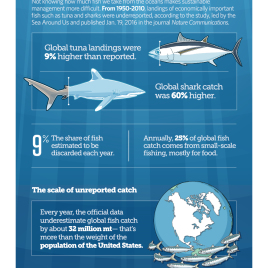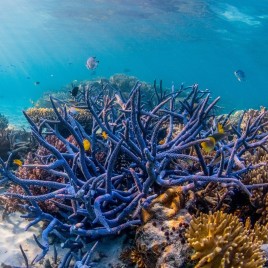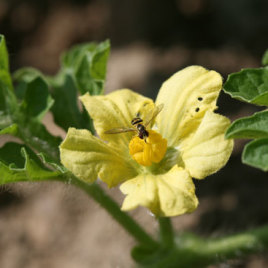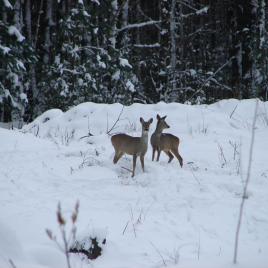Overlap in the ranges of sharks and fishing vessels is placing oceanic shark species at risk from overfishing say researchers. By monitoring the ranges of eight species of oceanic sharks by satellite, and tracking two fleets of longline fishing vessels over several years, researchers found about 80 per cent of the range of oceanic sharks […]
Tag: conservation

Underestimating global fisheries catches
Researchers have been substantially underestimating the total global fisheries’ catches by as much as 50 per cent, according to a new study. The results are based on “catch-reconstruction”, using scientific literature and asking local experts to help provide missing data. The researchers found increases in catches every year from 1950 to 1996, at which […]
Clean energy costs could price out the poorest
Reaching strict climate goals could mean that a sizeable number of people will remain dependent on traditional stoves, despite the negative health impacts. Researchers examined the relationship between climate mitigation policies and clean energy costs in South Asia. They found the most stringent mitigation policies could increase the cost of clean fuel by 38 per cent, leaving as many as 433 million South Asians […]

Marine protected areas failing to protect history
Marine protected areas (MPAs) are failing to protect the evolutionary diversity of fish and corals, according to a new study. The researchers conclude that over 7,000 million years of the evolutionary history of corals and 3,586 million years of fish evolution is not protected. Researchers studied 450 species of fish, which represent important components of marine biodiversity, and hundreds of species of coral, and calculated how […]
Icebergs leave trail of carbon-trapping plankton in their wake
Melting water from giant icebergs travelling across the Southern Ocean supports the growth of phytoplankton, which is responsible for as much as 20 per cent of the carbon trapped in the depths of the ocean. These icebergs enhance phytoplankton productivity for hundreds of kilometers, and their effects persist for at least one month after the iceberg […]
Budgeting for climate change – A series from Nature
This week a group of articles were published in Nature Geoscience and Nature Climate change jointly focused on “budgeting for climate change”. In one article, researchers, argue against the two degree target limit for global temperature rise. Another paper suggests we should aim to aggressively reduce our current emissions, as soon as possible, saying this […]

Don’t forget the other pollinators
Butterflies, wasps, beetles and flies might not be as effective pollinators as bees but new research shows their impact shouldn’t be discounted. Non-bee pollinators visit more flowers than bees so that even if they’re not such effective pollinators, their rates pollination are similar to bees. The analysis of 39 field studies revealed there is […]
The backwards effects of warming
Manipulating the food-web to reduce carbon-dioxide emissions may have the opposite effect under a warmer climate, according to a new study. Under certain conditions increasing water temperatures can cause what are called ‘trophic cascades’ – These occur when a population increase or decrease in a one species impacts other species in the food-chain, by making […]

The Nature of Chernobyl
At the site of the Chernobyl disaster, animals are thriving, according to findings from a long-term census. Researchers found populations of native wildlife, such as elk, deer, boars, and wolves, have bounced back, reaching a population size similar to nearby nature reserves. The researchers note that this growth in population occurred at a time when […]
Using the benefits of climate change to convince non-believers
Motivating people to take action on climate change, regardless of their existing beliefs, can be done by communicating the social benefits of acting in a climate-friendly way, according to researchers. Communicating development benefits (such as economic and scientific advancement) and the benevolence benefits (such as a more moral and caring community) helped to motivate people […]
The role of science in Canadian policy
The Science Integrity Project, which aims to make evidence-based decision-making a high priority for government at all levels, has released four principles for improving policy decisions using the best available evidence. The principles were developed through the collective wisdom of 75 leaders — in science, indigenous knowledge, public policy, civil society, and governance. The project […]
Top predators protecting trapped ocean carbon
Over-harvesting top level predators from the oceans and coastal habitats could have far-reaching consequences on the carbon cycle and diminish our ability to offset climate change. Coastal vegetation, such as seagrasses and mangroves, are more efficient at capturing and storing carbon than tropical rainforests, and account for more than half of the ocean’s carbon storage […]
Failing our fish: Most at-risk fish species less likely to be listed
The more at risk a marine fish is in Canada, the less likely it is to be listed on the Species At Risk Act according to new research. According to Susanna Fuller, co-author and Marine Program Coordinator at the Ecology Action Centre in Halifax, “less than 20% of at-risk marine fishes in Canada have been […]
Who owes what? Quantifying global climate debt
A letter in Nature Climate Change presents a new way to quantify the contribution each country has made to climate change through a nation’s carbon and climate debts. This new method ranks Canada as the fourth largest climate debt-holder. Considering only national CO2 emissions from fossil fuel combustion accumulated between 1990 and 2010 the […]
Global tree count: Seeing the forest through the trees
There are approximately three trillion trees in the world, according to density estimates of every continent except Antarctica, a number much larger than previous estimates of just over 400 billion trees. However their research also estimates that humans have cut down 46 per cent of the world’s trees since the beginning of human civilization. The […]
Weather impacts on insect gender
The gender of certain insects can be determined by the weather, and therefore influenced by climate change, according to new research. The authors believe this is the first study to show the effects of weather on insect gender. From 2008 to 2010 Researchers captured newly hatched weevils (Curculio elephas) after they emerged from the soil. […]
